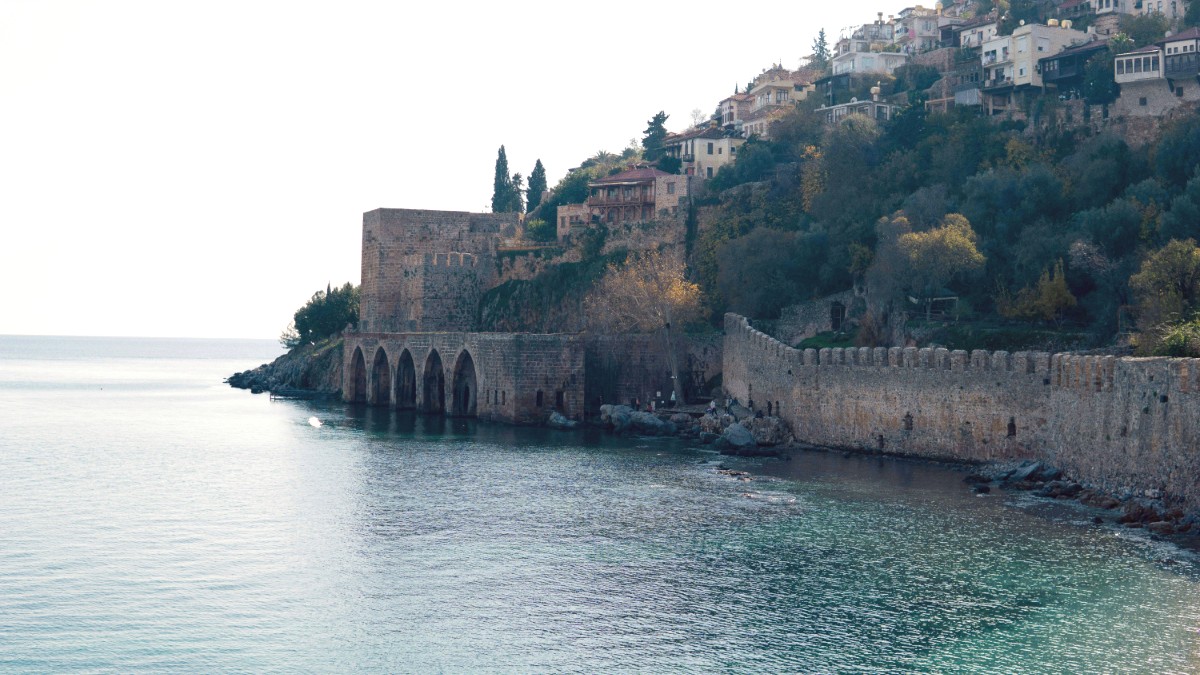
Mediterranean Coast, Turkey
Turkish cuisine reflects the country's rich history, from Central Asian roots to the Ottoman Empire. The Anatolian peninsula, with its diverse climate and fertile lands, always a wealth of ingredients.
The Seljuk and Ottoman periods significantly shaped the refined palace cuisine, while regional variations developed based on local ingredients and traditions.
Lamb, beef, and chicken widely used. Eggplant, tomatoes, peppers, onions, garlic, and cucumbers are staples. Legumes feature prominently.
Bulgur and rice are fundamental. Fresh herbs like mint, parsley, and dill used generously.
Red pepper flakes, cumin, sumac, and oregano add depth. Olive oil a cornerstone of Mediterranean cooking.
Globally recognized Turkish dish. Vertically roasted meat (lamb, beef, or chicken) shaved into thin slices. Often served in bread as a sandwich, or as a wrap (dürüm).
Widely available from street vendors and restaurants.
Famous dish from Bursa, widely available. Thinly sliced döner meat over warm pita bread, topped with hot tomato sauce and melted butter, with fresh yogurt on the side.
A rich and satisfying meal.
Often called "Turkish pizza." Thin, crispy, round flatbread topped with minced meat, chopped vegetables, and herbs. Typically rolled with lemon and parsley.
Found at local eateries and street food stalls.
Turkish flatbread baked with various toppings, typically elongated and boat-shaped. Common fillings: minced meat, cheese, or cheese and egg.
A savory Turkish flatbread, hand-rolled and cooked on a large griddle. Fillings can include cheese, spinach, potatoes, minced meat, or a combination.
Alanya has several upscale restaurants, especially those with panoramic sea or castle views. They feature refined Turkish cuisine or high-quality international dishes.
These are abundant throughout Alanya, giving a diverse menu of traditional Turkish kebabs, stews, fresh fish, and some international options.
Affordable options from local eateries (lokantas) to street food vendors.
Due to Alanya's international tourist base, restaurants cater to diverse palates.
Italian, Chinese, Indian, Russian, and other European cuisines are available.
These establishments are mainly found in more tourist-heavy areas, catering to diverse palates.
You will find many along the main roads, near Kleopatra Beach, and around the city center.
Restaurants along Dim River offer dining platforms directly over or next to the cool river. Refreshing escape.
Restaurants with panoramic views of Alanya Castle, especially at night when illuminated. Memorable experience.
Simple but delicious grilled fish sandwich from small boats or street vendors at the harbor.
Street food specialties like Simit (sesame-crusted bread) and Midye Dolma (stuffed mussels).
As a predominantly Muslim country, most meat served in Turkey is halal.
Kosher food generally not widely available outside specific Jewish communities in major cities like Istanbul or Izmir.
Using Google Translate or Microsoft Translator apps (download offline Turkish language pack) to communicate dietary requirements is important.
Prepare a small card with your specific dietary restrictions translated into Turkish. Show this to restaurant staff.
Some local guesthouses or specialized tour operators may informal cooking classes.
Food tours available, often combining historical walks with tastings of local street food and market produce.
Opportunities in surrounding rural areas to visit olive oil producers, fruit orchards, or local farms.
Circular, sesame-crusted bread ring; popular breakfast item or snack.
Cherries and apricots in early summer, watermelons and peaches in mid-summer, pomegranates and citrus fruits in autumn/winter.
Turkish people renowned for hospitality. Expect friendly service and often complimentary gestures, like a glass of tea.
Meze (appetizers) are typically ordered and shared among diners, making a communal dining experience.
Saying "Afiyet olsun!" (Enjoy your meal!) to others at the table or nearby diners is polite.
Turkish cuisine considered one of the world's great cuisines.